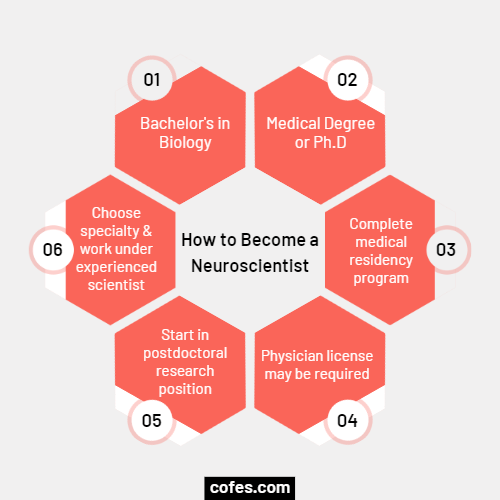Neuroscientists: The Innovators of The Mind
Neuroscientists are medical scientists who conduct research and clinical trials to improve the cognitive well-being of humans.
Their work is incredibly valuable in developing treatments for diseases and disabilities that affect thousands.
Several neuroscientists dedicate their lives to the profession with aspirations of getting published in a medical journal or finding a cure for a major psychiatric disorder.
There are several specialties neuroscientists can undertake, along with countless opportunities for development and growth.
While the path to becoming a neuroscientist is straightforward, it is far from easy.
Few have the perseverance and relentlessness to get through over a decade of formal academic training and post-graduate residencies.
Neuroscientist Job Information
| Official Job Title | Neuroscientist |
| Average Salary | $81,321 |
| Stress Level | High |
| Work/Life | Low |
| Job Satisfaction | High |
| Career Advancement | High |
Neuroscientist Job Description
What Is a Neuroscientist?
Neuroscientists study the brain’s impact on behavior and cognitive functions.
It is common for neuroscientists to specialize in a particular aspect of the brain, such as psychiatric disorders.
Neuroscientists conduct extensive research and develop solutions to emerging cognitive problems.
They review and innovate the diagnosis and treatment of psychiatric disorders, leading to increased quality of life.
Neuroscientists are true academics and often work in laboratories or hospitals.
The qualifications required of neuroscientists can vary depending on their working environment.

What Does A Neuroscientist Do On A Daily Basis?
Daily, Neuroscientists conduct extensive research on the nervous system.
They are often studying new articles to stay up-to-date with the latest research and advances in the medical world.
Daily, they work through problems and create new solutions for the patients they treat and study in clinical trials.
Responsibilities, Duties & Roles Of A Neuroscientist
An overview of the roles and responsibilities of a neuroscientist is listed below.
- Studying and staying up to date on the structural, medical, molecular, cellular, developmental, and functional aspects of the nervous system
- Developing frameworks and processes for the analysis of data
- Creating medical and pharmaceutical solutions
- Working with and studying patients during clinical trials
- Diagnosing psychiatric disorders
- Prescribing medical or sometimes non-medical treatments and therapies for patients.
- Conduct clinical investigations, research, and development on neurological behaviors.
- Conduct extensive research and experiments on the brain and analyze neurological responses to make discoveries.
- Write and report discoveries.
- Improve neurological procedures
Neuroscientist Salary
Average Salary
According to Payscale.com, the average salary for a neuroscientist in the U.S. is $81,661.
Starting Salary
According to Payscale.com, the starting salary for a neuroscientist in the U.S. is $71,296.
Senior Salary
According to Payscale.com, the senior salary for a neuroscientist in the U.S. is $163,000.
How To Become A Neuroscientist
The Entry Level: Certification, Training & Degree
The first step in becoming a neuroscientist is to earn a bachelor’s degree in a related subject, such as biology or neuroscience.
Afterward, you must earn a master’s degree in neuroscience.
To work as a clinical neuroscientist (primarily in hospitals), you must earn a Doctor of Medicine (MD) degree.
After the degree, clinical neuroscientists must complete a medical residency program and pass the United States Medical Licensing Exam (USMLE), which gives them the clearance to diagnose and treat patients.
Neuroscientists who solely want to work on the research side of neuroscience typically pursue a Ph.D. in neuroscience.
This program takes, on average, between five to six years to complete.
Luckily, a combined Ph.D. and M.D. program in neuroscience allows neuroscientists to work on their research while also working in clinical settings.
Other Skill Sets, Requirements & Qualifications
- Perseverance:
- Pursuing a career in neuroscience requires more formal education and training than you could ever imagine.
- Candidates must understand that this is a marathon and not a sprint.
- Growth Mindset:
- Neuroscientists need a growth mindset to thrive in a career like this.
- Life-long learning is not for everyone, but it certainly is for neuroscientists.
- There will always be new challenges and advances that affect processes and procedures.
- The ability to adapt to these circumstances is an asset.
How Long Does It Take To Become A Neuroscientist?
It takes 15 years to become a neuroscientist.
Is It Hard To Become A Neuroscientist?
Yes.
The road to becoming a neuroscientist is a long and academically rigorous one.
It is a career path that requires constant critical thinking and professional development.
Neuroscience courses are complex as they require a lot of terminology memorization and are usually combined with challenging sciences like chemistry, calculus, and biology.
Also, academic literature can be overwhelming due to its formality and complex way of explaining clinical trials and studies.
Neuroscience Career Paths

The Neuroscience Roadmap
While the roadmap to becoming a neuroscientist is straightforward, it is not easy.
First, you must earn a bachelor’s degree in a related subject, such as biology or neuroscience.
Afterward, you must earn a master’s degree in neuroscience.
In order to work as a clinical neuroscientist (primarily in hospitals), you will need to earn a Doctor of Medicine (MD) degree.
After the degree, clinical neuroscientists need to complete a medical residency program and pass the United States Medical Licensing Exam (USMLE), which allows them to diagnose and treat patients.
Neuroscientists who solely want to work on the research side of neuroscience typically pursue a Ph.D. in neuroscience.
This program takes, on average, between five to six years to complete.
Luckily, a combined Ph.D. and M.D. program in neuroscience allows neuroscientists to work on their research while working in clinical settings.
Projections For Growth In Neuroscientist Jobs
According to the U.S. Bureau of Labor and Statistics, jobs for Medical Scientists are set to grow by 17% through 2031.
In Summary: Is Neuroscience A Good Career?
Being a neuroscientist is a prestigious career to pursue.
It can be incredibly rewarding for those with a deep passion for science, research, and innovation.
Neuroscientists make a high income that can provide a comfortable lifestyle.
The demand for neuroscientists is only increasing, and few are willing to go far to become one.
It is important to remember that this job also requires a big time commitment.
A career like this requires so much mental capacity that it can leave you feeling fatigued and struggling to create a work-life balance.
Every dream job has downsides, so you have to figure out if it’s worthwhile.
Working Conditions
Can A Neuroscientist Work Remotely From Home?
Surprisingly, yes, neuroscientists can work from home.
However, it is important to consider what kind of neuroscience career you want to pursue.
Pursuing a clinical career in a hospital instead of a research career based in a lab may change that.
How Many Hours Does A Neuroscientist Work?
Neuroscientists typically work 40 hours per week minimum but often work more.
Can A Neuroscientist Work Part-Time?
Due to the nature of their work, it is uncommon for a neuroscientist to work part-time.
What Are The Average Vacation Days Of A Neuroscientist?
According to Indeed, the average number of vacation days among employees in the US is 11 days.
Several companies reward long-term employees with additional vacation days and flexibility.
Alternative Careers & Similar Jobs to a Neuroscientist
- Forensic Science Technician
- Nutritionist
- Natural Sciences Manager
- Dietitian
- Hydrologist
- Archaeologist
- Meteorologist
- Marine Biologist
- Physicist
- Research Assistant
Neuroscientist Resume Tips
If you are applying for a job in Neuroscience – be sure to include any published articles or studies you were a part of throughout your academic career.
Additionally, it is vital to add a cover letter.
This is a crucial part of your application that will help you stand out since most applicants don’t put the effort forth to write one.
Professors’ and instructors’ recommendation letters are also good at developing credibility and trust with the hiring manager.
Neuroscientist Interview Questions
Q1: What made you want to become a neuroscientist?
Why It Works: This is an excellent opportunity for you to talk about the first time neuroscience appealed to you and how it has evolved over your academic career.
Q2: What are you willing to sacrifice to be a successful neuroscientist?
Why It Works: Being a successful neuroscientist requires a relentless commitment.
Use this as an opportunity to show your dedication.
Q3: How do you feel about working from home?
Why It Works: The hiring manager wants to see if you are open to that flexibility and if you’ll still be productive if your job becomes fully remote.
Jobs Related To a Neuroscientist
- Neuroscientist Research Assistant
- Physician Assistant
- Pharmaceutical Sciences Manager
- Medical School Instructor
- Clinical Psychologist
- Psychiatrist
For HR Managers: Tips For Hiring A Neuroscientist
Key Characteristics To Look For In A Neuroscientist
- Strong Critical Thinking Skills: The ability to conceptualize, apply, analyze, and evaluate information by observation and gathering facts is essential.
- Decision-Making Skills: This line of work requires making sound judgments.
- Strong deductive and inductive reasoning skills: Deductive reasoning uses theories and beliefs to prove a conclusion.
- Inductive thinking uses experience and proven observations to guess the outcome.
Minimum Level of Education & Experience
Neuroscientist candidates should have an M.D. from an accredited Medical School, a Ph.D and must complete both a medical residency program and pass the United States Medical Licensing Exam (USMLE).
